PRINCETON, NJ -- Americans overwhelmingly favor Congress' passing a plan that would help fix the current Wall Street economic crisis, but a Wednesday night USA Today/���۴�ýpoll (conducted before Thursday's high-level negotiations between President Bush and congressional leaders on a new plan) shows that by more than a 2-to-1 ratio, Americans would like to see Congress pass a different plan rather than the $700 billion plan proposed by the Bush administration.
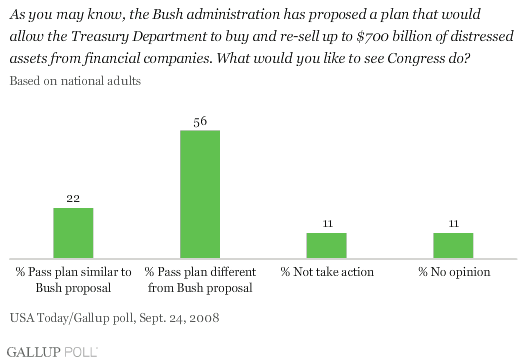
This key question was asked of more than 1,000 Americans on Wednesday night (Sept. 24), and described the Bush administration's plan as allowing "the Treasury Department to buy and re-sell up to $700 billion of distressed assets from financial companies." With this description, and given three choices of their preferred action (pass a plan similar to the Bush plan, pass a plan different from the Bush proposal, or not take any action at all), the majority of Americans opted for the middle alternative, with smaller percentages opting for either passing the Bush plan or not taking any action.
These data suggest that Americans should in broad terms favor the type of plan Congress was working on Thursday, but may have some disagreements as the precise details become known, particularly if it is viewed as being similar to the original Bush administration proposal.
Eight out of 10 Americans say they are following news of the financial problems on Wall Street and the Bush administration's proposals very or somewhat closely, with 43% "very" closely. This ranks in the upper tier of what ���۴�ýhas measured historically for news topics.
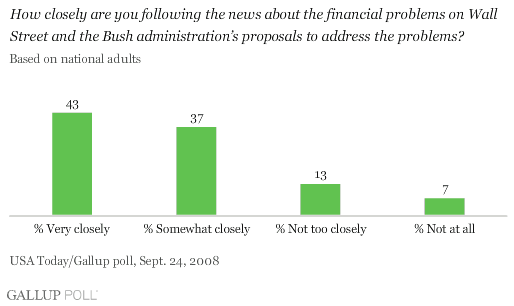
All discussions of the current financial crisis and proposals to resolve it are highly complex, even for professionals in the financial field. One can assume that Americans who are following the news very closely are more knowledgeable than others, but the views of the closely attentive group toward the plan are little different from those of the total sample: 24% of the attentive group favors the Bush proposal, 58% a plan different from the Bush proposal, and 12% no action at all.
One reason a high percentage of Americans feel some type of plan should be passed is evident from the fact that 74% of Americans believe the U.S. economy would get worse if Congress does not act at this time.
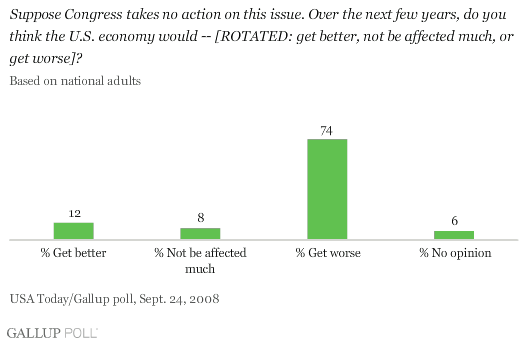
Moreover, 4 out of 10 Americans describe the current situation as the "biggest financial crisis" in their lifetimes.
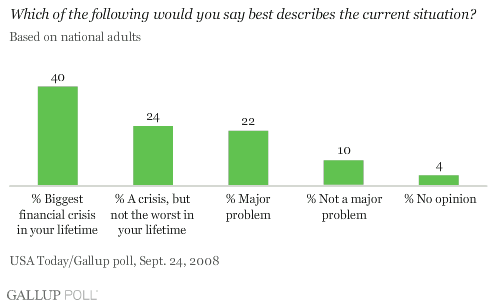
The biggest variation in responses to this question by age is among those who are 18 to 34. This group -- despite having had fewer years to be exposed to other financial crises in their lifetimes -- is actually less likely than those who are older to say this is the biggest financial crisis of their lifetimes. Americans 55 and older, some of whom may have been exposed to the Great Depression of the 1930s, are little different from the overall sample average in their views that this is the biggest financial crisis of their lifetimes.
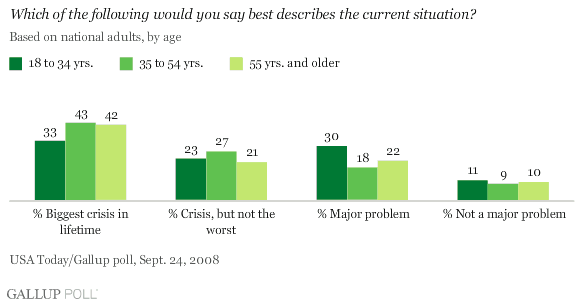
The bailout plan is still being worked out, but almost two-thirds of Americans say it would be very important to include in any government plan limits on compensation for executives at corporations that participate in the plan. About half say it is very important to include provisions to help homeowners who cannot pay their mortgages.
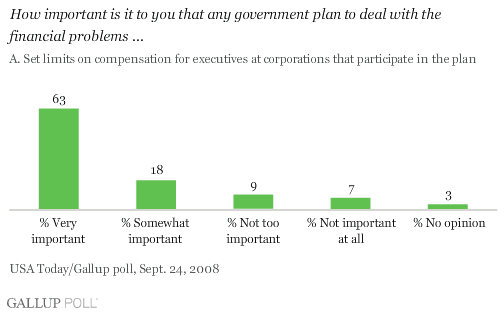
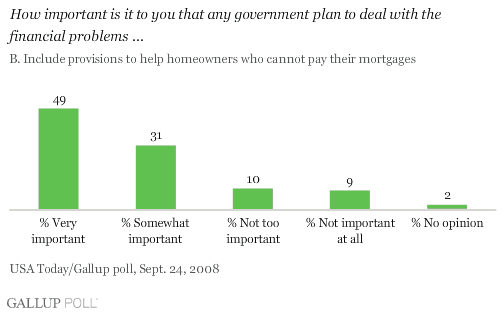
Survey Methods
Results are based on telephone interviews with 1,019 national adults, aged 18 and older, conducted Sept. 24, 2008. For results based on the total sample of national adults, one can say with 95% confidence that the maximum margin of sampling error is ±3 percentage points.
Interviews are conducted with respondents on land-line telephones (for respondents with a land-line telephone) and cellular phones (for respondents who are cell-phone only).
In addition to sampling error, question wording and practical difficulties in conducting surveys can introduce error or bias into the findings of public opinion polls. Polls conducted entirely in one day, such as this one, are subject to additional error or bias not found in polls conducted over several days.
To provide feedback or suggestions about how to improve Gallup.com, please e-mail feedback@gallup.com.
